#Ghanaian cuisine
Explore tagged Tumblr posts
Text

Vegan Palaver Sauce (Ghanaian Spinach and Tomato Stew) with Melon Seed ‘Dumplings’, Boiled Plantains, and Avocado
#vegan#lunch#dinner#Ghanaian cuisine#west african cuisine#stews#palaver sauce#spinach#tomatoes#ginger#garlic#chili#onion#tomato sauce#egusi#melon seeds#plantains#avocado#palm oil#sea salt
19 notes
·
View notes
Text

4 notes
·
View notes
Text

From Chains to Crown: Uncovering Your Roots in Ghana with Best Ghana Tours
As a member of the African diaspora, have you ever wondered about your ancestral heritage? Do you feel a deep connection to the continent of Africa, but aren't sure where to start exploring your roots? Look no further than Ghana, a country steeped in rich history, vibrant culture, and breathtaking natural beauty. And, with Best Ghana Tours, you'll have a trusted guide to help you navigate this transformative journey.

Ghana, formerly known as the Gold Coast, was a major hub for the transatlantic slave trade. Millions of enslaved Africans were forcibly taken from their homeland, leaving behind a legacy of pain, trauma, and disconnection. However, Ghana has emerged as a symbol of resilience, hope, and reunification.

The Call to Come Home
In 2019, Ghana launched the "Year of Return" initiative, inviting members of the diaspora to come home and reconnect with their heritage. This call to action marked the 400th anniversary of the first enslaved Africans arriving in Jamestown, Virginia. Since then, thousands have answered the call, making the journey to Ghana to discover their roots. Best Ghana Tours has been at the forefront of this movement, curating unforgettable experiences for those seeking to reconnect with their ancestral homeland.

Uncover Your History with Best Ghana Tours
With Best Ghana Tours, you'll embark on a journey of self-discovery, exploring:
- Cape Coast Castle, a former slave fort turned museum
- The National Museum of Ghana, showcasing the country's rich history and culture
- The vibrant markets of Accra, where you can find traditional textiles, crafts, and cuisine

Reconnect with Your Heritage
Best Ghana Tours offers immersive cultural experiences, allowing you to:
- Attend a traditional naming ceremony
- Learn traditional drumming or dance
- Indulge in delicious Ghanaian cuisine

Join the Movement
The "From Chains to Crown" movement is about reclaiming your heritage, embracing your identity, and connecting with your ancestral homeland. Join the thousands who have already made the journey home with Best Ghana Tours and experience the transformative power of Ghana for yourself.

Come Home to Ghana with Best Ghana Tours
So why wait? Book your tour with Best Ghana Tours today and get ready to uncover your roots in Ghana. Let the warmth of the Ghanaian people, the vibrancy of the culture, and the beauty of the land envelop you. You are not just a visitor – you are coming home.
Contact Best Ghana Tours:
[email protected] +233 503314400
Share Your Story
Have you already made the journey to Ghana with Best Ghana Tours or are you planning to? Share your story with us! Let's continue the conversation on social media using the hashtag.
#FromChainsToCrown #GhanaTravel #GhanaTours #Adventure #Nature #GhanaCulture #Tradition #Tourism #WestAfrica #Travel #Nature #Wildlife #safari #tourpackages #allinclusivepackages #travelwithus #traveltoghana #dettydecember #all #europe #ghanatourism #tour #tourpackages #travelwithus #landsccape #paradise #nature #adventure #explore #travel #travelling #inspiration #motivation #flowers #flowercore #photography #aesthetic #cottagecore #naturecore #mountains #cottage garden #cottage witch #farmcore #curators on tumblr #photographers on tumblr #dark academia aesthetic #goblincore #design #fashion #scenery #alternative
#fall aesthetic #artwork #landscape
#bestghanatours#tourism#travel#ghana#tour package#accra ghana#tourist#travelwithus#worldwide privacy tour#summer#diaspora#beyondthereturn#new york#homecoming#united states#europe#africa#vacation#holiday#dettydecember#decemberinghana#heritage#culture#history
32 notes
·
View notes
Text
3 notes
·
View notes
Text
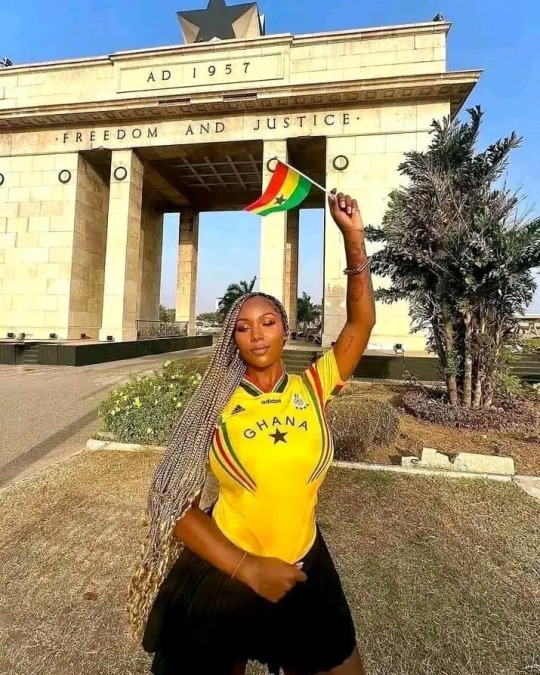
20 THINGS TO KEEP IN MIND WHEN VISITING GHANA 🇬🇭:
1. Respect local customs and traditions.
2. Learn some basic Twi phrases (e.g., "akwaaba" for "welcome").
3. Be prepared for vibrant markets and bustling streets.
4. Try local cuisine like fufu, banku, and jollof rice.
5. Explore Accra's historic sites like the Kwame Nkrumah Memorial Park. Visit the Cape Coast Castle in Central region of the country.
6. Visit the vibrant neighborhoods of Osu and Labadi.
7. Take a trip to the scenic Kakum National Park.
8. Learn about the Ashanti kingdom's rich history and culture.
9. Be mindful of your surroundings and keep valuables secure.
10. Bargain when shopping at markets (it's part of the culture!).
11. Stay hydrated and bring sunscreen.
12. Respect the local dress code, especially when visiting religious sites.
13. Try to avoid public displays of affection.
14. Learn about Ghana's complex history, including the slave trade and colonialism.
15. Engage with the friendly locals and ask questions.
16. Visit the Mole park in the Northern Ghana.
17. Try some local drinks like sobolo (hibiscus tea) and palm wine.
18. Explore the beautiful beaches along the coast.
19. Take a tour of the famous Kente cloth weavers.
20. Embrace the warmth and hospitality of the Ghanaian people.
Remember to approach your visit with an open mind, respect, and a willingness to learn. Enjoy your time in Ghana!
7 notes
·
View notes
Text

AFANG - Tripe Stew from West Africa
Without any iota of doubt, soups are a big part of the African cuisine, in fact, it is wise to say that African soups are the main attraction of cuisine in the continent.
African soups can be made with a combination of vegetables and ingredients that are native to the countries where they are most eaten.
Very many African soups are usually eaten with other food staples such as rice, fufu, banku, sadza, garri, pounded yam, and so on.
Below are some of our favorite soups from different African countries.
1. Okra soup
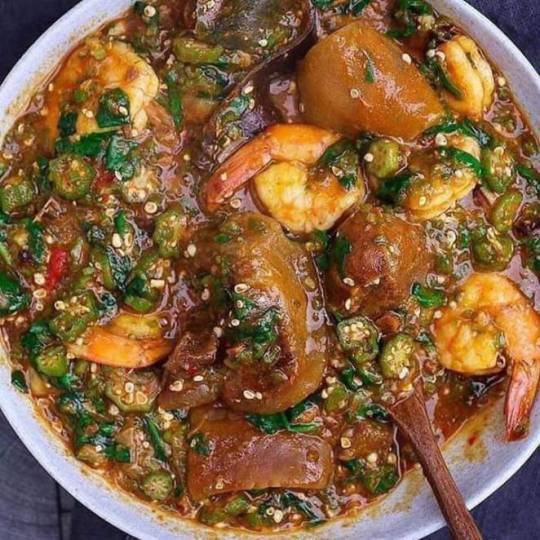
Okra soup is a popular west African dish with okra as its main ingredient. Although this deliciously slimy dish can be cooked with the local palm oil, it is also a good choice for people who are wary of adding oil to their soups.
2. Abenkwan
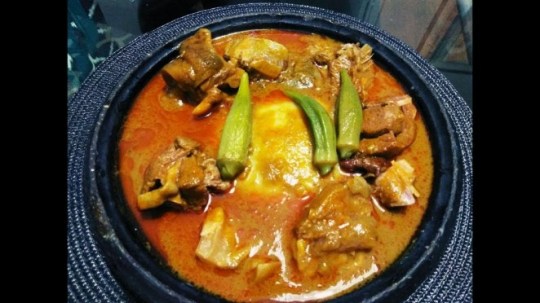
Abenkwan is a Ghanaian soup made from the nuts of the palm tree. The pulp is extracted from the palm fruits and cooked in combination with spices and preferred meat of choice.
Abenkwan has an earthy flavor thanks to the addition of the palm fruit pulp (which is different from the palm oil). Serve warm with rice balls or Kokonte and you will be satisfied to the moons and back.
3. Muriwo na Nyama
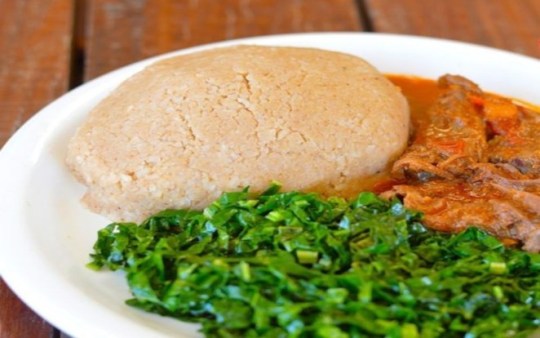
Muriwo na nyama is also known as leafy-beefy or high fields stew. It is native to Zimbabwe, highly nutritious and cn be eaten with sadza.
4. Pepper soup
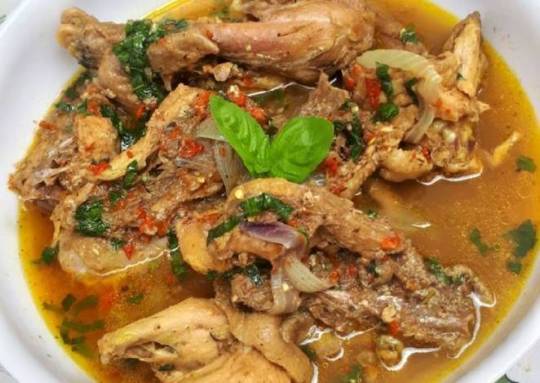
Pepper soup is a spicy African soup that will make your taste buds tingle with excitement. The soup is gotten from the stock of the meat or fish used. It is also spiced with local ingredients, giving it a tantalizing aroma and taste that will make you hungry even if you just had dinner.
For the best experience, have your pepper soup hot–not scalding hot of course– and thank us later.
5. Agushie/Egusi soup

Agushie (Ghana)/Egusi(Nigeria) is a delicious soup cooked with shelled melon seeds. The method of preparation might differ across the different regions in which this soup is eaten but it ultimately includes the addition of leafy greens, seasoning and palm oil. In Nigeria, its best served with freshly pounded yam.
6. Domoda

Domoda is the Gambia’s national dish, second only to Yassa. It is a yummy soup cooked with unsweetened peanut butter. It might also contain sweet potatoes. Domoda is better enjoyed with rice.
7. Afang
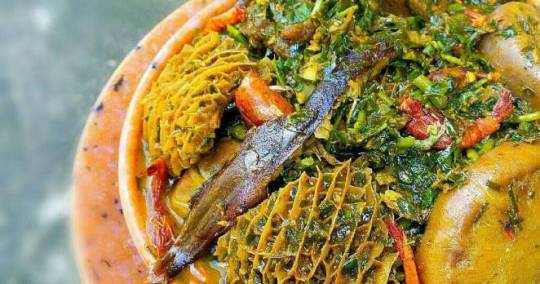
Afang is a delightful and satisfying soup from southern Nigeria. It is similar to the eru soup in Cameroon. They both make use of the afang/okazi leaves. However, the afang leaves are pounded and used in addition to water leaf. Afang soup is rich in deliciousness and best served hot with fufu and lots of meat.
8. Ndole
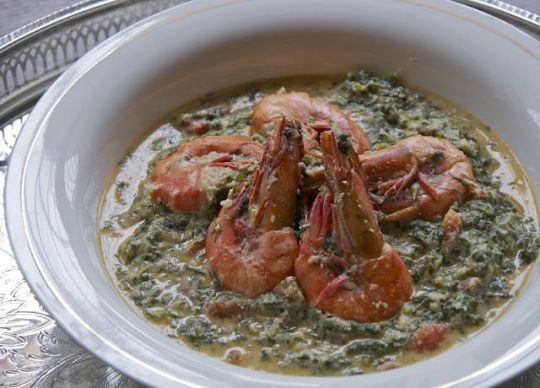
Ndole is another leafy vegetable soup with its home in Cameroon. It is often considered the national dish of the central African country. It’s a creamy and nutritious soup cooked with pureed peanuts and bitter leaf.
9. Afia efere/Ofe nsala
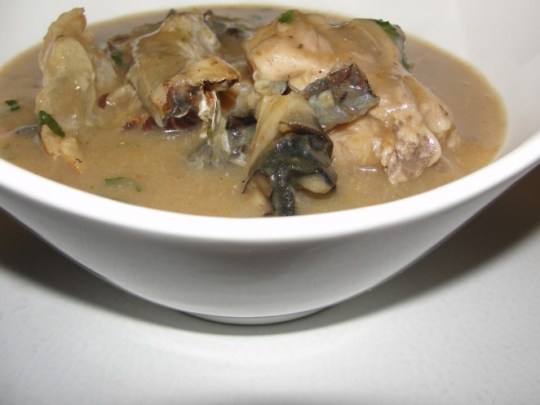
In the Nigerian local languages of Annang and Igbo, afia efere and ofe nsala respectively mean ‘white soup’ in English. Technically, this mouth-watering spicy soup should be called ‘brown soup’ but where’s the fun in that? It is apparently called ‘white’ for the lack of palm oil use.
10. Ewedu Soup
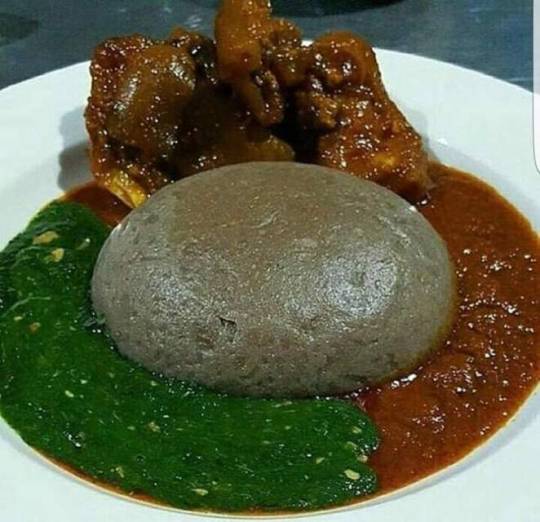
Ewedu is a Nigerian soup which is popular among the Yorubas. It’s a leafy vegetable soup but unlike other African soups, the greens (jute leaves) are pureed and cooked with nothing more than salt, locust beans and often potash.
It is usually served in addition to peppered stews (as pictured above) or gbegiri (beans soup). Yorubas love to eat this with amala, a starchy swallow made from yam peels and sometimes plantains.
#west african food#cooking#african food#stews#soups#main dish#african#Top 10 Delicious African Soups That Will Make You Salivate And Where They Are Best Made
87 notes
·
View notes
Text

Yes it’s Black History Month but for the whole of October, and to clear up any confusion: Yes there are more than one BHM one in the United States that’s on February and one in the United Kingdom that’s in October, and for some historical context; Black History Month in the UK started in the 1980s when a Ghanaian history advocate wished to spread history of the of Black population and community in the United Kingdom and it was successful and the rest is history. (Plus October seems to very popular month and time for lots of black individuals and communities I think) so if you want to celebrate, support black businesses, read about black authors, listen to musicians, learn about the history of them in GB, enjoy afro culture and cuisine and etc! Happy Black History Month; UK 2024 everyone!
#black history#black history month#black history month 2024#black history month uk 2024#black history month uk#black history month fanart#BHM#bhm 2024
2 notes
·
View notes
Note
Bpp I'm Ghanaian! Was lurking and saw your post about Nigerian and Korean food. Everything makes sense now hahaha. Nigerians are so cocky about how their jollof rice is the best. Nigerians are always attacking Ghana about how their food is better. It's jokes so no big deal but when I saw you mention Nigerian and Korean cuisine is good unprovoked I laughed OUT LOUD. I love my West African people. Pls don't ever change Bpp.
***
LOL.
It's true though. You haven't lived until you've tried Jollof Rice made by a Nigerian Yoruba buka, just as if you want to enjoy real Bibimbap, you have to go to Jeonju specifically. The flavour templates for both countries is very different, but I've found one good thing they have in common is that food typically leans more savory than sweet (compared to Japan for example where sweetness is the preferred taste), and in both, you bring the heat. Spicy actually means spicy in Korea. Food is hotter in Nigeria and West Africa in general, but Korea keeps up nicely. For my followers who don't know what either food is:
Nigerian Jollof Rice
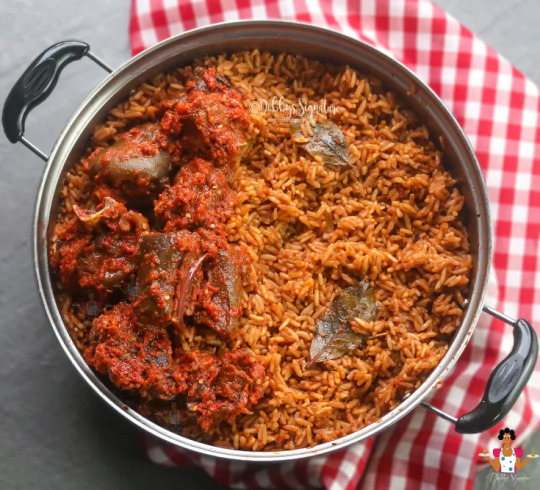
*
Jeonju Bibimbap
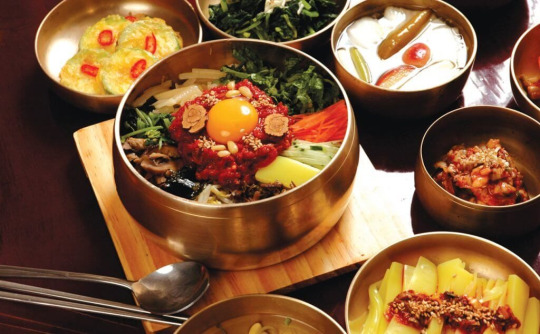
*
14 notes
·
View notes
Text
INTRO
Welcome to my Tumblr blog where I'll be sharing insights into the fascinating lifestyle of a Ghanaian student! Ghana is a beautiful West African country known for its rich culture and warm people. Being a student in Ghana is a unique experience that is full of adventure, learning, and fun.
As a Ghanaian student, life can be very busy and demanding, but we are known to take it all in stride with a smile on our faces. Our typical day begins early in the morning, with a quick breakfast of porridge, bread, or tea, before heading off to school. Traffic in Accra, the capital city, can be quite heavy, but we find ways to navigate it and still make it to class on time.
Once in class, we are engaged in various academic activities such as lectures, group projects, and assignments. Ghanaian students take their academics seriously and are always eager to learn, ask questions, and engage with their professors. We also enjoy participating in extracurricular activities like sports, music, dance, and drama.
During breaks, we often grab a quick snack from the campus canteen or food vendors nearby. Ghanaian cuisine is delicious, and we have a wide variety of options to choose from, including jollof rice, waakye, banku, and fufu. We also love our street foods like kelewele (spicy fried plantains) and bofrot (doughnuts).
After classes, we may spend time studying in the library, socializing with friends, or attending student association meetings. Ghanaian students are known for their friendliness, and we enjoy making new connections and building relationships.
As the day comes to a close, we head back home to our families, where we enjoy a home-cooked meal with our loved ones. Ghanaian families are very close-knit, and we value spending time together, sharing stories, and catching up on each other's lives.
Weekends are often spent doing chores, attending religious services, or participating in community events. Ghanaian students are actively involved in community service and are committed to making a positive impact in their communities.
In conclusion, being a Ghanaian student is a unique and fulfilling experience. We are hardworking, friendly, and love to have fun. We are proud of our rich culture and heritage and are always eager to share it with the world.
#AfricanLifestyle#AfricanCulture#AfricanTradition#AfricanHeritage#AfricanFashion#AfricanArt#AfricanFood#AfricanBeauty#BlackExcellence#MelaninMagic#Afrocentric#AfroCulture#AfroFashion#AfroArt#AfroFood#BlackHistoryMonth#BlackCulture#BlackLivesMatter#AfricaRising#ProudlyAfrican#WeAreAfrica#DiscoverAfrica#MyAfricaMyPride#AfricanVibes#AfricaStyle#AfricaBlogger
2 notes
·
View notes
Text
Are you searching for an unforgettable culinary adventure that takes your taste buds on a journey across the African continent? Look no further! If you’ve been typing “African restaurant near me” or “African Food Restaurant in Perth” into your search bar, this guide is for you. Perth boasts a growing number of restaurants that celebrate the rich and diverse flavors of Africa. Whether you’re craving spicy stews, grilled meats, or comforting bowls of fufu, the city offers authentic dining experiences you won’t forget.
Exploring African Cuisine in Perth
African cuisine is a tapestry of flavors, reflecting the continent’s diverse cultures, climates, and histories. From the tangy, spiced dishes of North Africa to the hearty, savory meals of West Africa, every dish tells a story. Perth has become a hub for food enthusiasts eager to explore the rich traditions of African cooking.
In this blog, we’ll highlight some of the best African food restaurants in Perth where you can enjoy authentic flavors and a warm, welcoming atmosphere. So, whether you’re new to African cuisine or a seasoned lover of the dishes, you’re in for a treat.
The Essence of African Cuisine
African cuisine is characterized by its bold flavors, vibrant colors, and unique cooking techniques. Key ingredients include:
Spices: From the fiery heat of peri-peri to the aromatic blend of berbere, spices are the soul of African cooking.
Staples: Ingredients like cassava, plantains, and maize are common, paired with stews and sauces.
Proteins: Grilled meats, fresh fish, and legumes are central to many African dishes.
When dining at an African Food Restaurant in Perth, you can expect to encounter these traditional flavors. Restaurants like Aseda Jeegs are known for their dedication to authenticity, offering dishes like jollof rice, egusi soup, and injera.
Discover Aseda Jeegs: A Taste of Ghana
If you’re looking for a quintessential African dining experience, Aseda Jeegs should be at the top of your list. Aseda Jeegs specializes in Ghanaian cuisine, offering a menu that’s as vibrant as the culture it represents. Signature dishes include:
Jollof Rice: A flavorful rice dish cooked in a rich tomato base with spices and served with grilled chicken or fish.
Fufu with Light Soup: A staple in Ghana, this dish pairs a starchy ball of fufu with a tangy, flavorful soup.
Waakye: A traditional rice and beans dish often served with boiled eggs and fried plantains.
Aseda Jeegs combines great food with a cozy ambiance, making it a popular choice for those searching for an “African restaurant near me” in Perth.
Ethiopian Delights: Exploring Injera and More
Ethiopian cuisine is another highlight of Perth’s African dining scene. Known for its communal style of eating, Ethiopian food is served on a large platter with injera – a spongy, sourdough flatbread – as the base.
Must-Try Ethiopian Dishes:
Doro Wat: A spicy chicken stew often referred to as Ethiopia’s national dish.
Misir Wat: A lentil stew seasoned with berbere spice.
Kitfo: Minced raw beef seasoned with spices and served with collard greens.
Restaurants offering Ethiopian cuisine provide an authentic and cultural dining experience. Look for these options when you’re craving a truly communal meal.
North African Flavors: From Tagines to Couscous
North African cuisine brings a mix of Mediterranean and Middle Eastern influences. Restaurants in Perth serving dishes from countries like Morocco, Algeria, and Tunisia offer a unique dining experience.
Highlights of North African Cuisine:
Tagines: Slow-cooked stews made with meats, vegetables, and a medley of spices.
Couscous: A light and fluffy grain often served as a base for stews and sauces.
Harira Soup: A hearty soup made with lentils, chickpeas, and tomatoes.
These dishes are perfect for those seeking a blend of exotic flavors and comforting meals. Be sure to explore these options when visiting an African Food Restaurant in Perth.
South African Braais: A Feast for Meat Lovers
A braai, or South African barbecue, is a celebration of meat and community. South African restaurants in Perth bring this tradition to life with their grills fired up to perfection.
Popular South African Dishes:
Boerewors: A traditional sausage with a blend of spices.
Bunny Chow: A hollowed-out loaf of bread filled with spicy curry.
Bobotie: A savory mince dish baked with a creamy egg topping.
Whether you’re dining in or ordering for delivery, South African cuisine offers hearty and satisfying meals.
Hidden Gems: Discovering African Fusion Cuisine in Perth
While traditional dishes are always a delight, some restaurants in Perth are putting a modern spin on African cuisine. These fusion eateries blend traditional African flavors with global techniques to create innovative dishes.
Examples of Fusion Creations:
Peri-Peri Chicken Tacos: A mix of African spices and Mexican presentation.
Jollof Sushi Rolls: A creative twist on the classic rice dish.
Plantain Burgers: Combining African staples with Western comfort food.
These unique offerings are perfect for foodies looking for something new and exciting. Don’t miss out on these creative takes when exploring an “African restaurant near me” in Perth.
Why Choose African Restaurants in Perth?
Dining at an African Food Restaurant in Perth offers more than just delicious food; it’s an opportunity to:
Experience rich cultural traditions.
Enjoy diverse flavors and ingredients.
Support local businesses that celebrate heritage and authenticity.
Restaurants like Aseda Jeegs pride themselves on offering a true taste of Africa, bringing the continent’s culinary treasures to your table.
Conclusion: Savor the Flavors of Africa in Perth
Perth’s African food scene is a vibrant and growing community of restaurants that celebrate the rich and diverse flavors of the continent. Whether you’re dining in at Aseda Jeegs, exploring Ethiopian delights, or enjoying a South African braai, there’s something for everyone.
If you’ve been searching for an “African restaurant near me” or an African Food Restaurant in Perth, now is the perfect time to explore the incredible dining options available. Each bite is a journey, a story, and a celebration of culture.
To get more information about us, please visit: https://bit.ly/3ZVYwLm
0 notes
Text
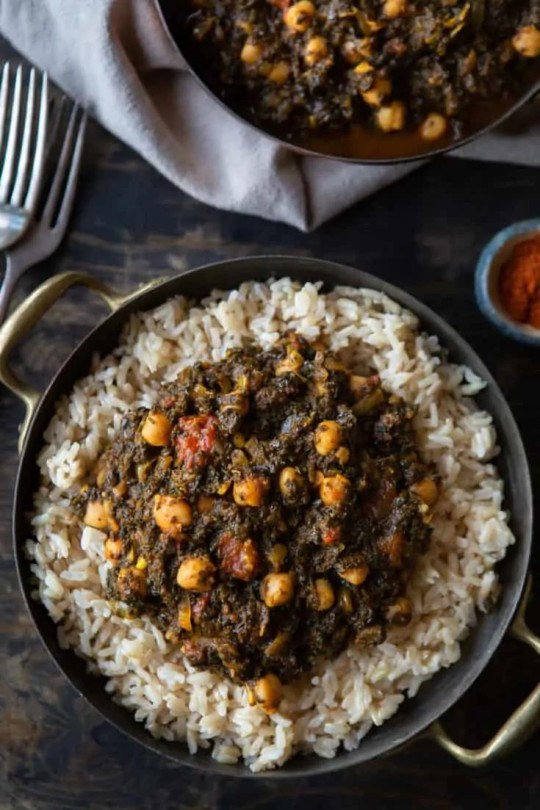

Ghanaian Spinach Stew with Chickpeas (Vegan)
#vegan#lunch#dinner#stews#ghanaian cuisine#west african cuisine#african cuisine#spinach#chickpeas#tomatoes#garlic#onion#ginger#chili#tomato sauce#turmeric#sea salt
85 notes
·
View notes
Text
Watch "Meal Prep with me! Let's make Ghana Beans Stew|| Sharing Meal Prep Tips" on YouTube
youtube
#repost#meal prep inspiration#Youtube#african cuisine#african food#ghanaian food#ghana#bean stew#meal prep inspo#meal prep
1 note
·
View note
Text
AAFT Showcases Culinary Delights from Ghana at the 17th Global Film Festival Noida

Noida, India – The 17th Global Film Festival Noida (GFFN) featured a vibrant Food Festival celebrating the rich culinary heritage of Ghana. Organized by the International Chamber of Media and Entertainment Industry (ICMEI) in association with the AAFT School of Hospitality and Tourism and the International Film and Television Club (IFTC), the event took place at Marwah Studios, Film City, Noida.
Cuisines from Ghana were prominently displayed, offering attendees a unique opportunity to experience the country’s diverse flavors. The Food Festival, a highlight of the Global Film Festival, aimed to strengthen cultural ties and foster international collaboration through culinary arts.
The festival was inaugurated by Conrad Nanakajo Asidu, First Secretary at the High Commission of Ghana. During his address, Asidu remarked, “Ghana’s cuisine is a reflection of its rich cultural heritage, and events like these provide a platform to share our traditions with the world. I am delighted to see such an enthusiastic response to our culinary offerings.”
Sandeep Marwah, President of Marwah Studios and the driving force behind the Global Film Festival, emphasized the importance of the Food Festival in fostering cultural exchange. He stated, “Food festivals are an integral part of the Global Film Festival. They bring together the essence of different cultures, creating a platform for dialogue and appreciation. The Indo-Ghana Film and Cultural Forum has been instrumental in strengthening the bond between our two nations.”
The Ghanaian Food Festival not only delighted the taste buds of attendees but also highlighted the strong cultural ties between India and Ghana. This event marked yet another step in the festival’s mission to celebrate global unity through art, culture, and cuisine.
As the aroma of Ghanaian delicacies filled the air, the festival proved to be a feast not just for the palate but also for the spirit of cultural understanding and friendship.
#AAFT Showcases Culinary Delights from Ghana at the 17th GFFN#Dr. Sandeep Marwah President of 17th GFFN 2024
0 notes
Text
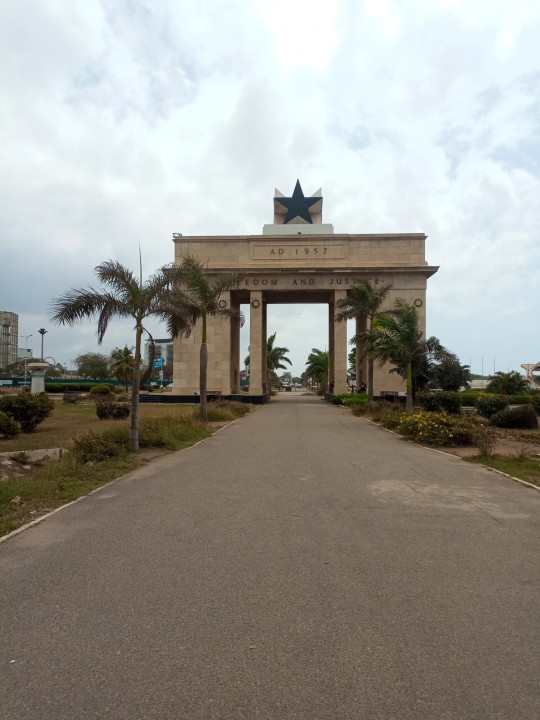
Unlocking Ghana's Cultural Tapestry: A Journey Beyond Accra.
When travelers think of Ghana, the bustling capital city of Accra often takes center stage. While Accra offers a glimpse into the nation's vibrant energy and diversity, the true essence of Ghanaian culture lies in the distinct regional identities that exist beyond the city limits. To unlock a deeper understanding of this West African gem, it's essential to venture out and immerse yourself in the captivating cultural landscapes that make Ghana so remarkable.
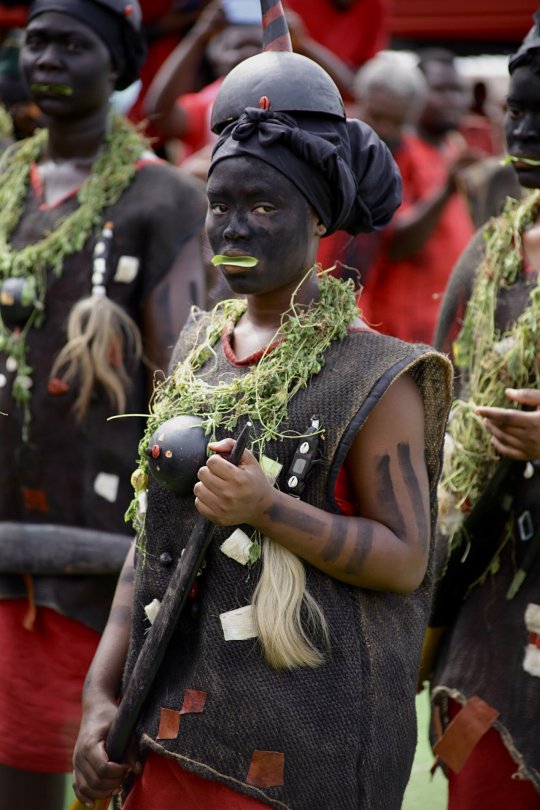
Start your cultural odyssey in the Ashanti Region, the heartland of the prestigious Ashanti Kingdom. At the center of this cultural epicenter lies Kumasi, a city that pulses with history and tradition. Wander the halls of the magnificent Manhyia Palace, the seat of the Asantehene, the revered Ashanti monarch, and witness the grandeur of the Akwasidae Festival. This spectacular celebration honors the Ashanti's royal ancestors through mesmerizing dances, rhythmic drumming, and the intricate display of ornate kente cloth. Dive into the region's rich artisanal legacy by exploring the workshops of skilled kente weavers and gold jewelry makers, whose craftsmanship has been honed over generations.
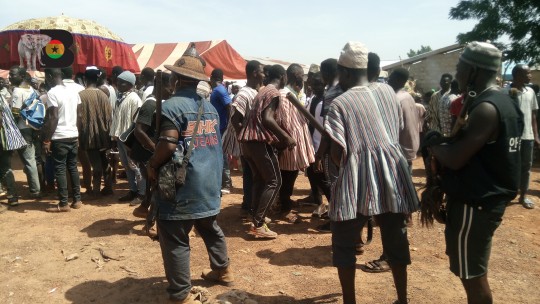
Venture north to the captivating Northern Region, where the Dagomba, Gonja and other tribes have preserved their distinct cultural identity. In the bustling city of Tamale, marvel at the Sahelian-style architecture, with its mud-brick structures and striking silhouettes. Attend a traditional funeral ceremony or the vibrant Damba Festival, which commemorates the birth of the Prophet Muhammad through a dazzling display of music, dance, and religious rituals. Seek out the ancient mud-brick mosques, such as the Larabanga Mosque, one of the oldest in West Africa, and immerse yourself in the region's deep Islamic heritage.
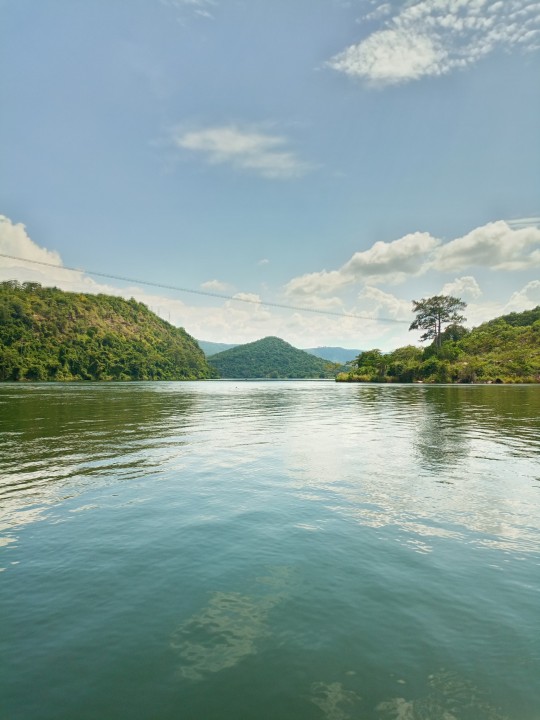
Shifting your focus eastward, the Volta Region offers a glimpse into the unique Ewe culture. In towns like Ho and Keta, witness the mesmerizing traditional dances and learn about the Ewe's captivating language and culinary traditions. Explore the picturesque landscapes of the region, from the cascading Wli Waterfalls to the serene Kalakpa Resource Reserve, where you can connect with the rhythms of nature and the local communities.
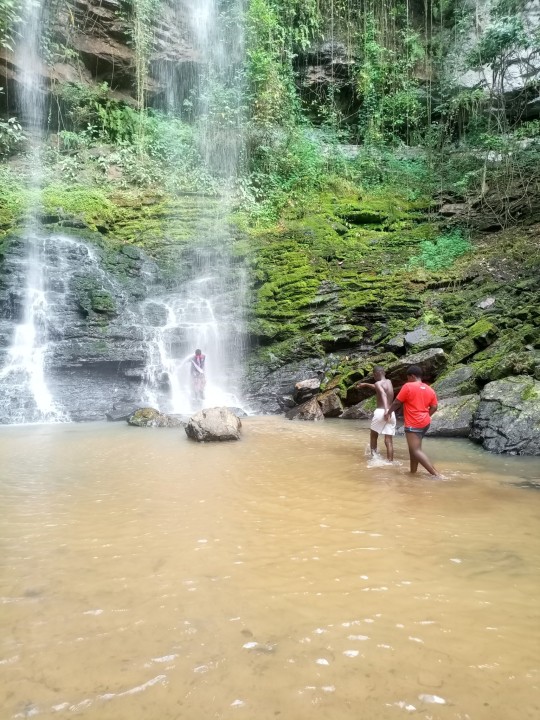
Staying within the Greater Accra Region, venture to the fishing villages of Jamestown and Chorkor to experience the vibrant Ga culture. Observe the daily lives of the Ga people, their colorful architectural style, and their rich cultural celebrations, such as the Homowo Festival, which commemorates the victory over famine. Engage with the local artisans and learn about their time-honored crafts, from pottery to basket weaving.
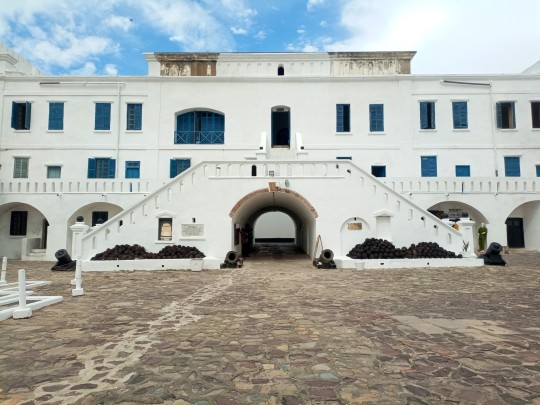
Finally, make your way to the Central Region to immerse yourself in the Fante culture. Explore the historic towns of Cape Coast and Elmina, where the remnants of colonial-era forts and castles stand as silent witnesses to the region's complex past. Observe the traditional fishing practices and vibrant local markets, and attend the Oguaa Fetu Afahye, a captivating Fante cultural festival featuring music, dance, and mouthwatering cuisine.
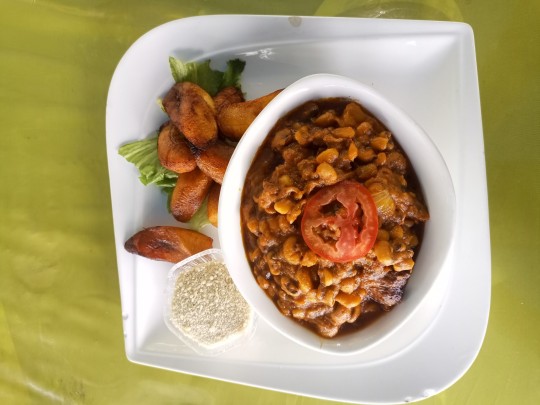
By venturing beyond the confines of Accra, you'll unlock a deeper understanding of Ghana's diversity and the unique regional identities that make this country so captivating. Each region offers a distinct cultural experience, from the regal Ashanti heritage to the centuries-old Islamic influence in the north, the mesmerizing Ewe traditions in the east, the vibrant Ga community in the capital, and the maritime Fante culture in the center. Embrace the opportunity to connect with the local people, learn about their customs and beliefs, and leave with a newfound appreciation for the richness and complexity of Ghanaian culture.
So pack your bags, open your heart, and embark on a cultural odyssey that will leave you forever transformed by the diversity and beauty of Ghana, beyond the boundaries of its capital city. Unlock the true essence of this remarkable nation by venturing out and immersing yourself in the captivating regional identities that make Ghana a cultural tapestry worth exploring.
#bestghanatours#tourism#travel#ghana#tour package#accra ghana#tourist#travelwithus#worldwide privacy tour#summer#private#private tour#city tour#accra#voltaregion#northern lights#safari#nature#wildlife#adventure#marketing#sale#black tumblr#blacktravel#travelgram
4 notes
·
View notes
Text
'I am a Ga lad; I like my heat and my cuisine - Idris Elba on moving to Africa
British actor Idris Elba has announced ambitions to migrate to Africa within the next decade, motivated by a desire to promote the continent’s burgeoning film industry. Known for his roles in The Wire and Luther, the 52-year-old star is leading initiatives to build film studios in both Zanzibar and Accra, Ghana. Elba, who has a Ghanaian mother and a Sierra Leonean father, is determined to use…
0 notes
Text
Online Ghana Groceries
Shop authentic Ghanaian products at Online Ghana Groceries! We bring the rich flavors of Ghana straight to your doorstep. Browse our selection of staple foods like gari, banku mix, and kenkey, along with a variety of spices, palm oil, and shito sauce to enhance your meals. Freshly sourced ingredients and packaged foods are available, perfect for preparing traditional dishes like jollof rice, fufu, and light soup. With convenient delivery options, satisfying your cravings for Ghanaian cuisine has never been easier. Explore the tastes of Ghana from the comfort of your home!

0 notes